Earlier this month, voters in Iceland rejected for the second time a referendum that would have implemented a plan to repay the U.K. and the Netherlands for losses stemming from the collapse of Iceland’s banking industry. In an email interview, Fridrik Mar Baldursson, professor of economics at the Reykjavik University School of Business, discussed the Icesave crisis. WPR: What is the background of the Icesave crisis? Fridrik Mar Baldursson: Before the financial crisis, foreign branches of Landsbanki, one of Iceland’s failed banks, collected deposits in Internet savings accounts in the U.K. and the Netherlands marketed under the “Icesave” brand. When […]
Europe Archive
Free Newsletter
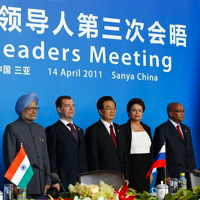
Representing around 40 percent of the world’s population and nearly a quarter of its economic output, Brazil, Russia, India, China and South Africa — the so-called BRICS countries — came together last week for a leaders summit to show off their growing global heft. The joint statement produced by the one-day meeting on China’s southern resort island of Hainan underscored the need for a realignment of the post-World War II global order based on the untrammelled supremacy of the U.S. The governing structure of international financial institutions, the statement said, “should reflect the changes in the world economy, increasing the […]

The Obama administration has begun talks with Afghanistan designed to quell the Karzai government’s fears about being abandoned by the West come 2014. Those talks are said to involve negotiations for long-term basing of U.S. troops involved in training Afghan security forces and supporting future counterterrorism operations. This can be seen as a realistic course of action, given our continuing lack of success in nation-building there, as well as our inability — although perhaps unwillingness is a better term — to erect some regional security architecture that might replace our presence. But there are good reasons to question this course. […]
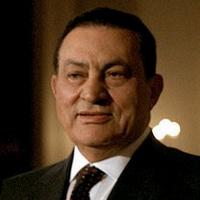
Six months ago, Hosni Mubarak was the unchallenged ruler of Egypt, and his son Gamal was generally assumed to be the heir-apparent — a modernizer and reformer waiting in the wings. Today, Mubarak père is detained in hospital, while Mubarak fils is prisoner No. 23 at Tora Farm, the country’s most notorious prison. The wheel of fortune has turned so dramatically for the Mubaraks, in part because the provisional military government found it necessary to mollify protesters — who continue to challenge its reform bona fides — by vigorously taking action against the ancien regime. Indeed, with the wheels of […]
The Libyan intervention is now reaching an inflection point, with the limited initial commitment of force apparently incapable of achieving the expressed — and universally desired — strategic outcome of driving Moammar Gadhafi from power. As a result, Britain and France will send small teams of military advisers in an effort to improve the rebels’ fighting capability, and the U.S. has decided to commit UAV drones to the intervention. But neither measure is likely to have a rapidly decisive impact on the fighting, which has now devolved into a war of attrition that neither side seems poised to win, which […]
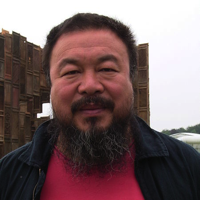
When the Arab uprisings started spreading across the Middle East, human rights and democracy activists around the world held high hopes that the peaceful push for reform would spread to the many countries where populations live under repressive leadership. After protesters succeeded in overthrowing Egyptian President Hosni Mubarak, a British member of parliament declared, “I would like to see regime change in Zimbabwe and Burma.” The sentiment was optimistically echoed by exiles of repressive states and their supporters in many places. For a moment, it seemed as if the exultant Egyptian protesters might just unleash a wave of freedom that […]
Kyrgyzstan recently moved to open membership negotiations with the customs union formed by Russia, Kazakhstan and Belarus in mid-2010. In an email interview, Alexander Libman, a professor of international political economy at the Frankfurt School of Management and Finance, discussed the prospect of the customs union’s expansion. WPR: What are benefits of the customs union for Russia and the other countries that have joined? Alexander Libman: The three countries in the customs union (CU) — Russia, Belarus and Kazakhstan — exhibit a relatively high level of economic interconnection, partly inherited from their Soviet past and partly created anew through the […]
Finland’s pro-Europe National Coalition led by Finance Minister Jyrki Katainen has won Finland’s general election but is set to form a government with the country’s anti-euro bloc.The unlikely pairing which is considered a major political upset also bodes ill for Portugal’s bailout package as the euro-sceptics have threatened to oppose its rescue plan.
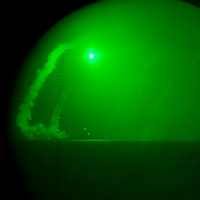
The Obama administration’s reluctant involvement in the Libya operation recalls the Biblical adage, “One man sows, another reaps.” The United States agreed to undertake the heavy lifting needed to get the air campaign started, in particular handling the precision strikes to disable Moammar Gadhafi’s air defenses, suppress some of his heavy weapon capabilities and target the very centers of his regime’s power in Tripoli. But the understanding was that responsibility would subsequently be transferred onto the shoulders of others: the Libyan rebels, our NATO allies and other partners. In every speech and statement, President Barack Obama was quite clear that […]
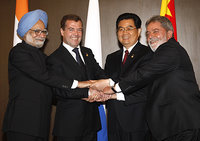
South Africa will formally join the BRIC grouping of Brazil, Russia, India and China at their April 14 summit in Hainan, China. Echoing previous meetings, the major focus of the summit will be to consolidate the impression that the BRICs are the rising force in the global arena. The June 2009 Yekaterinburg summit was hailed as an “historic event” by Russian President Dmitry Medvedev and was punctuated by a call for “the emerging and developing economies [to] have a greater voice and representation in international financial institutions” (.pdf). Then-Brazilian President Lula da Silva, host of the April 2010 summit, upped […]
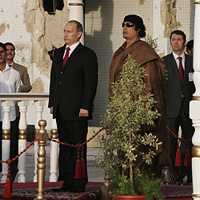
The Russian government has effectively managed to balance its competing interests regarding Libya, despite having much less influence on events there than many other governments. The Russian delegation to the U.N. Security Council (UNSC) voted to impose sanctions against Moammar Gadhafi’s regime for its violent suppression of peaceful demonstrators, but abstained on the crucial March 17 vote authorizing the use of force to protect civilians from the Libyan government. Russia’s U.N. ambassador, Vitaly Churkin, said that Moscow could not support the resolution since it lacked clearly defined limits on using military force. After Western countries initiated wide-ranging military operations against […]
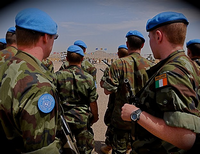
A recent issue of the prestigious European magazine Europe’s World contains an eye-catching advertisement for NATO: “Question: Which organization adopted a new vision of its geopolitical role in Lisbon? Hint: It wasn’t the European Union!” The ad’s not so subtle jibe has been borne out by the Libyan crisis, which caught the EU, but not NATO, by surprise. Despite the $43 million the European Commission made available for humanitarian assistance to those in Libya and neighboring countries most affected by the crisis, as well as the EU’s prompt imposition of an arms embargo and an asset freeze on the Libyan […]
The potential long-term impact of the Libya intervention has more to do with changing people’s thinking than with changing the reality on the ground in Libya. The past 40 years have already demonstrated that the West can manage the discrete problem represented by Moammar Gadhafi. What it cannot handle is the aggregate problem represented by a continuation of the status quo, both in the broader region but also in the shifting geopolitical landscape beyond it. By highlighting a number of major shortcomings in that status quo, the Libyan intervention just might be the wake-up call needed to generate a more […]
Turkey’s evolving response to the Libyan crisis is just the “latest indication of its goal to be a power broker on the world stage,” the Associated Press reported earlier this week. Henri Barkey, a visiting scholar in the Middle East Program at the Carnegie Endowment for International Peace, says the Turkish government has “always thought that in the past, the Turks have punched well below their weight.” “Now, with the Turkish economy doing very well, as the 16th-largest economy in the world . . . Turkey is much more able to play an international role, especially in the Caucusus and […]
